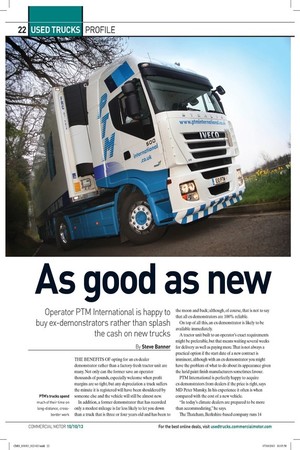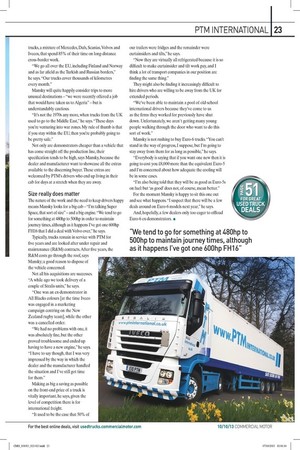As good as new
Page 18

Page 19

If you've noticed an error in this article please click here to report it so we can fix it.
Operator PTM International is happy to buy ex-demonstrators rather than splash the cash on new trucks By Steve Banner
THE BENEFITS OF opting for an ex-dealer demonstrator rather than a factory-fresh tractor unit are many. Not only can the former save an operator thousands of pounds, especially welcome when profit margins are so tight, but any depreciation a truck suffers the minute it is registered will have been shouldered by someone else and the vehicle will still be almost new. In addition, a former demonstrator that has recorded only a modest mileage is far less likely to let you down than a truck that is three or four years old and has been to
the moon and back; although, of course, that is not to say that all ex-demonstrators are 100% reliable.
On top of all this, an ex-demonstrator is likely to be available immediately.
A tractor unit built to an operator's exact requirements might be preferable, but that means waiting several weeks for delivery as well as paying more. That is not always a practical option if the start date of a new contract is imminent, although with an ex-demonstrator you might have the problem of what to do about its appearance given the lurid paint finish manufacturers sometimes favour.
PTM International is perfectly happy to acquire ex-demonstrators from dealers if the price is right, says MD Peter Mansky. In his experience it often is when compared with the cost of a new vehicle.
"In today's climate dealers are prepared to be more than accommodating," he says. The Thatcham, Berkshire-based company runs 14
trucks, a mixture of Mercedes, Dafs, Scanias,Volvos and Ivecos, that spend 85% of their time on long-distance cross-border work.
"We go all over the EU, including Finland and Norway and as far afield as the Turkish and Russian borders," he says. "Our trucks cover thousands of kilometres every month."
Mansky will quite happily consider trips to more unusual destinations — "we were recently offered a job that would have taken us to Algeria" — but is understandably cautious.
"It's not the 1970s any more, when trucks from the UK used to go to the Middle East," he says. "These days you're venturing into war zones. My rule of thumb is that if you stay within the EU, then you're probably going to be pretty safe."
Not only are demonstrators cheaper than a vehicle that has come straight off the production line, their specification tends to be high, says Mansky, because the dealer and manufacturer want to showcase all the extras available to the discerning buyer. These extras are welcomed by PTM's drivers who end up living in their cab for days at a stretch when they are away.
Size really does matter
The nature of the work and the need to keep drivers happy means Mansky looks for a big cab —"I'm talking Super Space, that sort of size" — and a big engine. "We tend to go for something at 480hp to 500hp in order to maintain journey times, although as it happens I've got one 600hp FH16 that I did a deal with Volvo over," he says. Typically, trucks remain in service with PTM for five years and are looked after under repair and maintenance (R&M) contracts. After five years, the
R&M costs go through the roof, says Mansky; a good reason to dispose of the vehicle concerned.
Not all his acquisitions are successes. "A while ago we took delivery of a couple of Stralis units," he says.
"One was an ex-demonstrator in All Blacks colours [at the time Iveco was engaged in a marketing campaign centring on the New Zealand rugby team], while the other was a cancelled order.
"We had no problems with one, it was absolutely fine, but the other proved troublesome and ended up having to have a new engine," he says. "I have to say though, that I was very impressed by the way in which the dealer and the manufacturer handled the situation and I've still got time for them."
Making as big a saving as possible on the front-end price of a truck is vitally important, he says, given the level of competition there is for international freight. "It used to be the case that 50% of
our trailers were fridges and the remainder were curtainsiders and tilts," he says.
"Now they are virtually all refrigerated because it is so difficult to make curtainsider and tilt work pay, and I think a lot of transport companies in our position are finding the same thing."
They might also be finding it increasingly difficult to hire drivers who are willing to be away from the UK for extended periods.
"We've been able to maintain a pool of old-school international drivers because they've come to us as the firms they worked for previously have shut down. Unfortunately, we aren't getting many young people walking through the door who want to do this sort of work."
Mansky is not rushing to buy Euro-6 trucks. "You can't stand in the way of progress, I suppose, but I'm going to stay away from them for as long as possible," he says.
"Everybody is saying that if you want one new then it is going to cost you £8,000 more than the equivalent Euro-5 and I'm concerned about how adequate the cooling will be in some cases.
"I'm also being told that they will be as good as Euro-5s on fuel: but 'as good' does not, of course, mean better."
For the moment Mansky is happy to sit this one out and see what happens. "I suspect that there will be a few deals around on Euro-6 models next year," he says. And, hopefully, a few dealers only too eager to offload Euro-6 ex-demonstrators. •









































